Literature Review
To understand the importance of attending a convention as an effective professional development option for teachers, it is necessary to know why teachers attend these events in the first place. Knowing the reasons the participants may have, either as individuals or as members of a team, could be a start for effective collaboration in which institutions and participants can pursue continuous professional development and organizers might facilitate the participants’ achievement of goals. In Mexico becoming an updated teacher is one of many priorities for our authorities, such as coordinators or directors, and for the Secretary of Public Education in Mexico (SEP/Secretaria de Educación Pública). English teachers, voluntarily or on the request of their workplaces, regularly have engaged in different professional development processes such as attending workshops or enrolling in short courses to improve either their language level or their teaching skills.
Professional development is a must for English teachers at all levels and teachers are encouraged to pursue it. Day (1999) defines professional development as “the set of natural learning experiences as well as the conscious and planned activities whose purpose is to benefit the individual, group or school directly or indirectly and which have the objective to contribute to the quality of classroom education” (p. 4). Richards and Farrell (2005) refer to professional development as “the general growth aimed at reaching a longer term-goal and which often involves examining the different dimensions of the teachers’ practice in order to improve their performance in the classroom” (p. 4). However, Nieto (2009) goes beyond the teaching practice by reminding us that, it is “through professional development that teachers refresh their mission, solidarity, and empathy towards their students in order to challenge the knowledge and conventional wisdom in order to help them develop a passion for social justice” (p. 9). Diaz Maggioli (2003b) describes professional development as “an ongoing learning process in which teachers voluntarily engage to learn how best to adjust their teaching to the learning needs of students” (p. 1). One claim of this article is that teachers should take the initiative in pursuing their own professional development and challenge their knowledge by attending an EFL/ESL convention.
Research in the EFL field so far has indicated that teachers make many choices when pursuing their professional development. For example, Bailey, Curtis and Nunan (2001) mention journals, action research, team teaching, portfolios, mentoring-coaching and reflective teaching as examples of professional development. These options help provide teachers with opportunities to grow during their teaching careers. These authors explain that there are seven reasons for teacher development:
- To acquire new knowledge and skills,
- To keep pace with change,
- To increase our income or/and prestige,
- To add an impressive line to our curriculum vitae,
- To increase our power by increasing our knowledge,
- To avoid burnout,
- To combat negativity. (Bailey, Curtis & Nunan, 2001, pp. 6-7)
All these reasons are significant and they might occur at different times during a teacher’s career. Professional development happens when teachers become aware of their areas of opportunities or needs or when their institutions require it. The individual reasons each teacher has to pursue professional development are usually defined by the teacher’s specific context or the career stage in which the teacher finds him/herself. Attending a conference is one option for teacher development. When attending a convention, it is common to see teachers from different backgrounds and of all ages gathering together. Throughout their teaching careers, teachers have different needs and interests to be met. These may include learning new techniques, understanding theories of learning and teaching, or finding out more information for a thesis or a research project.
A convention can provide an array of options for professional development that can meet teachers’ needs in their careers. Teachers move through several stages or career cycles as explained by Huberman (1995). According to this author, there are four phases during the career of a teacher and this explains why teachers have different needs at the different stages. The first of these stages is career entry and it is characterized by a process of survival and discovery when everything is new and the level of novelty is high. Then, teachers go through a stabilization phase, when teachers look for experimentation or start asking themselves if they want to stay in the profession or if they should go for diversification. After that stage, teachers may find serenity if they choose to stay in the field. Finally, they may find themselves in a disengagement stage that might be serene or bitter according to their own personal experiences. Each one of these stages involves different needs for professional development that can be achieved formally or informally, according to Day (1999). One of the challenges for the organizers of a convention is to provide variety so that the needs of individual teachers are met, whether they are novice or experts.
However, something else to explore is the social aspect of on-going teacher learning. Musanti and Pence (2010) claim that “professional development needs to be conceived as a collaborative enterprise, where a space for learning through mutual exchange, dialogue, and constant challenge is created” (p. 87). Day (1999) and Johnston (2009) have also highlighted the idea that professional development should be seen as a social collaborative process. Lieberman and Mace (2008) maintain that teachers learn through “practice (learning by doing), through meaning (learning as intentional) and through community” (p. 227). Collaboration then plays an important role in professional development and attending a convention can be an opportunity to interact and get in touch with peers from different contexts and undertake actions with collaboration purposes.
Crandall (2001) claims that attending international ELT (English Language Teaching) conferences is a powerful and refreshing experience for all teachers to experience and to find out what is happening in the field. According to Borg (2014), thousands of ELT professionals around the world attend numerous conferences each year, and the teachers’ participation in such events may have a positive impact upon their careers and practice. The increasing number of conventions and conferences may indicate that language teachers are more interested in these events.
Attending a convention as an option for professional development is critical for teachers who cannot commit themselves to long-term endeavors, such as getting a university degree. Diaz-Maggioli (2002a, p. 6) states that there are teachers who are constantly looking for motivation to renew their commitment to their teaching careers; he also mentions that attending a convention is a useful and safe way for novice teachers to explore new ideas and techniques. However, conventions seem to be a temporary solution to Continuous Professional Development (CPD) and several issues have emerged with the raising number of events taking place in almost all around the world. Institutions seem to foster the attendance of English teachers to such conventions by sponsoring them or giving teachers the opportunities to attend them. Yet, from my own experience as a teacher and a teacher-educator no follow up of the attendance to the event is explored, missing an opportunity to implement and reflect on the presentations seen and the knowledge acquired. This follow up could be the opportunity teachers need to make reflection on or to socialize the outcomes of the convention with their peers and colleagues who could not attend the event. In the results section I include some suggestions for the proposed follow up.
To focus the direction of this paper, three research questions were developed:
- What are the reasons that Mexican EFL teachers attend ELT conventions?
- What do Mexican EFL teachers do with what they have gained during the convention when they return to their workplaces?
- How can Mexican EFL teachers receive more benefits from attending a convention?
Methodology
The Context
The MEXTESOL International Convention is well-recognized by English teachers in Mexico as a good opportunity to stay abreast in the ELT field. This annual convention takes place at the end of the year in either October or November. The participants attending this convention range from students pursuing a major in Education or English Language Teaching (ELT) to teachers from different levels of the public and private education sectors in the country. This convention is also attended by ELT researchers and people involved in different publishing houses.
The Study
This qualitative study explored the reasons why English teachers attend the MEXTESOL convention and what they do with what they learned during the event. Denzel and Lincoln, (2005) refer to qualitative research as making sense of the meanings that people relate to experiences and in this case, I wanted to explore the meanings participants gave for attending a convention. I began to wonder why participants attended the conventions and what actions could be done after the convention when returning to their own contexts. I was particularly interested in how teachers took advantage of the convention talks and materials at the event. It was my impression that something else could be done to maximize the teachers’ experience and learning based upon their attendance at the convention. I wanted to develop ideas on how to help the teachers to benefit more from attending a convention in order to foster professional development as individuals and as part of a team after an EFL/ESL event.
Technique
For the purposes of the study, a short questionnaire was given to 32 participants during the 41st MEXTESOL International Convention in Puebla, Mexico in 2014. The questionnaire included five questions for teachers to answer (see Appendix A). The first two questions were aimed at obtaining general information, such as gender and the participants’ place of origin. The other three questions were open-ended and intended to collect more information concerning the participants’ reasons to attend the event, their preferences of what the convention offered and what they expected to do with the knowledge they acquired at the convention in their contexts.
The questionnaire was piloted with three teachers who answered it voluntarily in order to ensure the clarity of the questions before the conference. Then it was given to the participants on the last day of the convention after they had had the opportunity to attend most of the events. It was felt that at the end they had developed their opinions. It took participants about five minutes to answer the questions which they did during breaks or between sessions. The open-questions gave me the opportunity to analyze and organize the answers but also to explore and make an interpretation in a qualitative way.
The participants
The 32 participants (20 females and 12 males) were randomly chosen, looking for a variety of ages, places of origin and backgrounds. They were informed of how their answers would be used in this small research project. The questionnaire was given only to Mexicans, as they were the intended target population for this article. The following chart shows the participants’ places of origin.
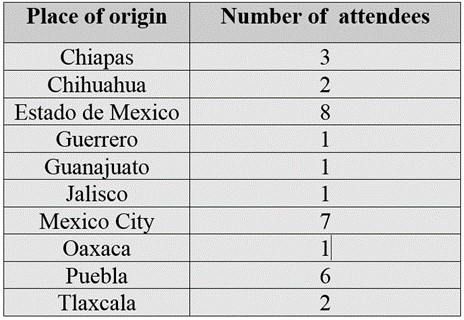
Chart 1. The participants’ place of origin.
The results

In this section the answers to questions 2, 3, and 4 will be explored individually and complete answers are shown in Appendix B.
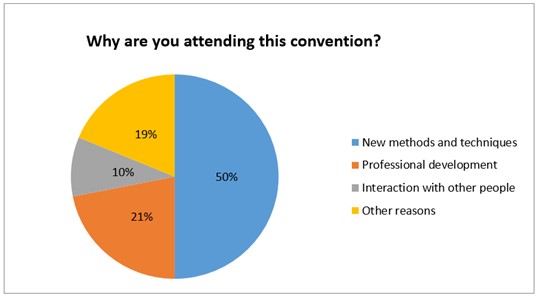
Graph 1. The reasons teachers attended the convention.

The answers to question 2 show what teachers say concerning their reasons for attending the convention. Half of the teachers mentioned their interest in learning new methods and techniques to implement them in their own classrooms. The second most popular reason was to pursue professional development and the third reason the participants mentioned was to interact with other people from the ELT community.
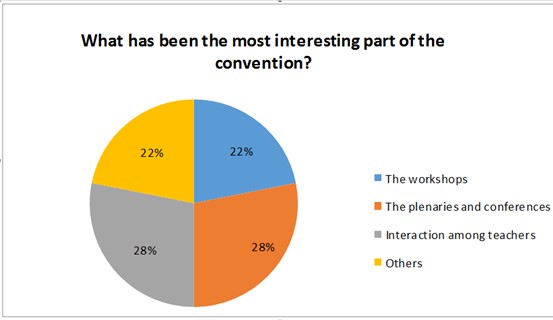
Graph 2. What the attendees found the most interesting.

The answers to question 3 illustrate what teachers found the most interesting while attending the convention. Their answers varied from the workshops to the plenaries and the conferences given by specialists in EFL/ESL topics. The interactions with peers and with people from other places or countries, as well as professional development, were also mentioned as the activities they liked.
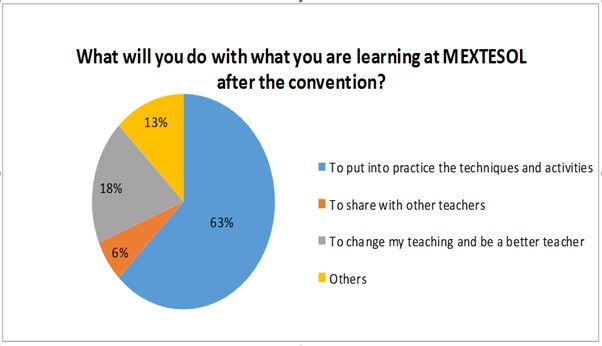
Graph 3. What the attendees plan to do after the convention.
Interestingly, question 4 received the least diversity of answers. Teachers seemed to have enjoyed, learned and engaged in activities during the convention. However, they did not show evidence of having made a plan of what to do with the knowledge and information they had received at the event. Some of the answers revealed a very personal and radical position such as a decision to make changes in their teaching as they became aware of the difference between what theory says and what teachers experience in their daily practice. Another interesting answer for this question was “to write my thesis”. In spite of being a very praiseworthy reason, it was only mentioned by one attendee. One of the teachers, probably in a different stage of his/her career, replied that reflection was the activity he/she would take on after the convention. Gebhard and Oprandy (1999) state that when teachers become interested in reflection, it may lead them to gain awareness of their teaching beliefs and practices and enable them to see teaching differently and in this way they can advance their own professional development. Concerning what the teachers were planning to do when they got back to their work, some planned to put to practice the techniques and activities they learned during the convention and even share the information with their peers.
The answers given to the questionnaire prove that teachers in Mexico may have different reasons and motivations for attending a convention. These answers can be related to Huberman’s (1995) frame of the stages of a teaching career. This model may provide a way to understand the different teachers´ needs that a convention might attempt to fulfill. Figure 1 shows some examples of the participants’ answers organized according to Huberman’s teacher career stages.
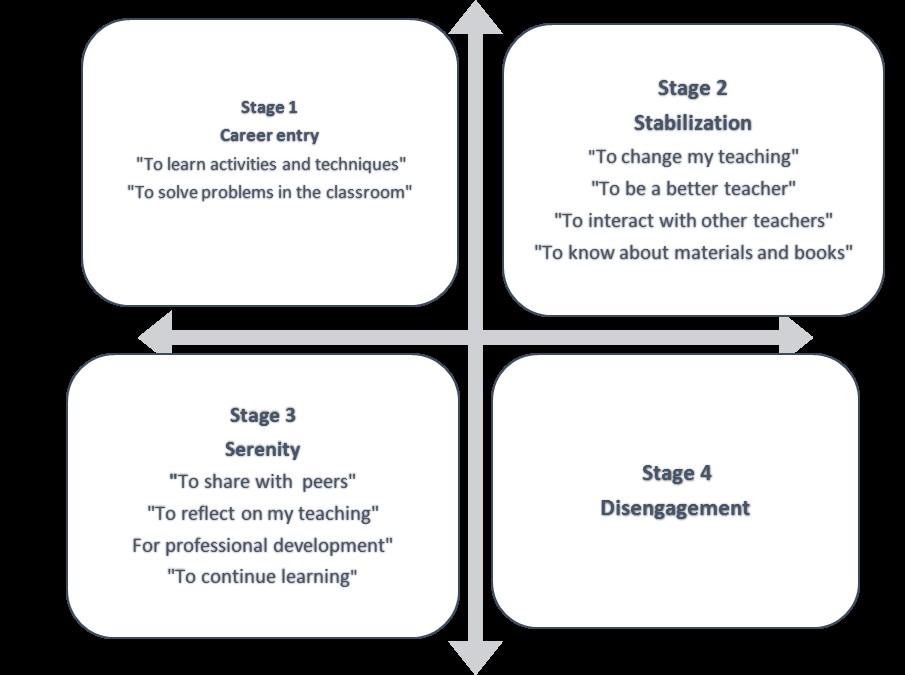

Fig. 1. Teacher’s answers according to Huberman’s frame of teaching stages.
Huberman (1995) mentions that this cycle may happen naturally as a teacher gets older, but a new career path may begin in the life of a teacher when there is an innovation or a change in the teacher’s career (e.g., the implementation of a new methodology or technique or a new job). Huberman’s frame emphasizes the teachers’ needs as a process and a path for individual growth as well as an opportunity for collaboration as professional development tends to take place not only in personal contexts but in social contexts. The participants’ answers organized according to Huberman’s frame (1995) show that conventions are opportunities for teachers to look for workshops or activities that meet their different needs and for organizers to provide the activities attendees are expecting as individuals and as groups. The next section will suggest ideas that attendees or institutions may implement to promote more interest in professional development.
Proposals for School Coordinators and Teachers
After analyzing and organizing the participants’ answers, I realized that attending a convention may be the first step in encouraging professional development and teachers can undertake some actions to enhance their professional growth. As shown by the answers, they all have different purposes or interests when attending ELT events. Some of them might be looking for techniques to present topics in their classroom and some of them might be looking for ideas for research, for example. Therefore, in this section I will present five suggestions to be considered by school coordinators and the teachers themselves. These suggestions are offered as additional tools for teachers when they attend a convention. Each one of the recommendations is accompanied by a format that can be used and filled out while attending the convention (see Appendix C).
1. Set personal or/and institutional goals before attending the event
Coordinators and teachers may get together and analyze the program before attending the convention and agree on some common goals for attending the event. Graves (2000) claims that teachers who determine goals and objectives for their actions and programs get better results; this can also be applied to the probable outcomes of attending a convention, setting objectives may lead to better results. Some teachers might focus on attending workshops; some teachers might be more interested in attending research sessions or plenaries. Before the event, each teacher could write one or two personal objectives and the institution could also establish a goal for the teachers who will attend the event. Setting clear goals and objectives might give the teachers a sense of direction before attending and a sense of accomplishment once the event is over. An example of such actions could be as 
follows:
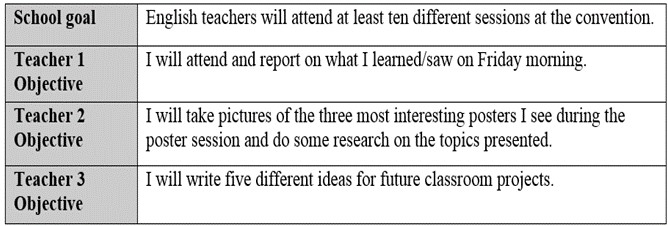
Chart 2. Setting goals and objectives before attending the convention.
2. Identify new or current topics in the field
Richards and Rodgers (2001) suggest that “in the twentieth century, language teaching was characterized by the frequent change and innovation and by the development of sometimes competing language teaching ideologies” (p.1). However, in the twenty-first century teachers should also develop different skills, such as global and digital awareness which might impact the EFL classroom in order to incorporate new approaches such as content, culture, technology and lifelong skills as Taylor, (2009) states. As a result of this frequent change and innovation, new topics or methodologies have emerged in the ESL/EFL field, and it is not easy to keep track of all of them when we are in our classrooms or immersed in the daily routine. After graduating from a teacher education program, attending a convention can be a refreshing way through which teachers can see what is going on in the profession and what teachers around the country or the world are doing in their language classrooms. Knowing what is new in the field at the time of the event may become the starting point of inquiry or research as teachers may develop a clear picture of the current trends in research and teaching practices. In times of an accelerated change, teachers can become aware of what kind of research is being carried out in the field. This might lead teachers to do research or get involved in action research in their own contexts by applying the new knowledge acquired in the event. Additionally, through these actions teachers may start learning more about specific topics of their interest or even start a long-term endeavor such as a master’s or doctoral degree.
3. Network for joint projects and collaboration
During the different events in the convention, participants usually find themselves sitting next to other teachers from a completely different teaching context. Exchanging email addresses and a nice chat can be the beginning of an inter-institutional project that might enrich our teaching practice. In fact, if teachers are attending the same session, it is very likely that they have similar interests that can be used to their professional advantage. One of the advantages of networking in EFL conferences is the sense of belonging and identification that we can find with people that share the same interests, goals and practices as Lave and Wenger (1991) state in their theory of the communities of practice. By being part of a community of practice, teachers can enhance interaction with peers and get involved in the creation of knowledge and products that may complement each other’s teaching practice (Wenger, McDermott, & Snyder, 2002).
4. Plan some sharing sessions with the rest of the staff
Not all teachers or coordinators in an institution are able to attend a convention, either for personal or professional reasons. This, however, can be a good opportunity to implement some sharing sessions led by the teachers who could attend the event. These sessions may have the twofold purpose of: 1) disseminating and sharing knowledge, and 2) giving teachers the confidence to start thinking of presenting in a future convention. Meirink, Meijer, and Verlopp (2007) have found that collaborative settings are preferred in most schools to facilitate the exchange of ideas and to assist in the formulation of common instructional designs and assessments. Sharing sessions can also be the time to plan for a future attendance to another event or they can be the appropriate space to start collaboration projects that may encourage a joint professional development process in the institution.
5. Invite peers into our classrooms
The findings of this study revealed that teachers attend a convention with the idea of taking note of activities or techniques that they can use in their own classrooms. However, as Guskey and Huberman (1995) state, even when new techniques have demonstrable merit, “training in them may be ineffective when it does not address the real conditions of teachers’ work” (p. 26). Involving teachers in reflection processes to integrate new knowledge into their daily practice could foster meaningful creativity instead of mechanical reproduction of models or patterns. To enhance reflection and the implementation of new activities into real contexts, teachers could invite some of their peers to observe these new ideas or techniques. Taking an idea from a convention and implementing it in the classroom may be a good opportunity to share and discuss ideas. Additionally, when we open our classroom doors, we also open the possibilities for positive feedback and a different level of sharing knowledge.
By providing these recommendations, I hope that attending a convention may be more meaningful for attendees once they go back to their schools. I also base these recommendations on my own experiences after attending ELT events. I have always felt that something else could be done in my case. Therefore, I attempt to link teachers’ professional development and their needs to the different opportunities they can find when attending a convention. Seeing the usual things we do from a different perspective can be a way for teachers to receive more benefits. At the same time, knowing about the different teachers’ needs might be valuable information for organizers of these events to take into account.
Conclusions
The growing number of conventions for ESL/EFL teachers opens the possibilities for professional development. The variety of these events gives evidence to the fact that language teachers and institutions are looking for ways to provide teachers with opportunities to learn from each other, and develop professionally. However, these developmental opportunities may not be fully taken advantage of due to the lack of clarity of the possible purposes and outcomes of a convention. This might represent a challenge or an opportunity because teachers have reasons for going to these events according to their own interests and teaching career stage.
The suggestions presented in this article might enhance a systematic way of recording objectives and actions done, before, during or after the event. An awareness of the possibilities in which teachers might benefit from a convention might lead teachers to reflect and to gain insights concerning their practice of teaching. Institutions could also encourage teachers to participate in conferences as attendees, presenters or even organizers and this participation develops self-confidence and the gain of knowledge. In the end there are many benefits for teachers when they go to a conference, whether it is local, national or international. These benefits are valuable for teachers when they go down the path of their life-long professional development.
References
Bailey, K. M., Curtis, A., & Nunan, D. (2001). Pursuing professional development: The self as source. Boston, MA: Heinle & Heinle.
Borg, S. (2014). The benefits of attending ELT conferences. ELT Journal, 69(1), 35-46. DOI: 10.1093/elt/ccu045.
Crandall, J.(2001). Keeping up to date as an ESL or EFL professional.In M. Celce-Murcia (Ed.). Teaching English as a second or foreign language. (3rd ed.) pp. 535-552. Boston, MA; Heinle & Heinle.
Day, C. (1999). Developing teachers: The challenges of lifelong learning. New York: Routledge.
Denzin, N. K., & Lincoln, Y. S. (2005). Introduction: The discipline and practice of qualitative research. In N. K. Denzin & Y. S. Lincoln (Eds.), The SAGE handbook of qualitative research (3rd ed.). Thousand Oaks, CA: Sage.
Díaz-Maggioli, G. (2003a). Options for professional development. English Teaching Forum, 41(2), 2-21.
Díaz Maggioli, G. (2003b). Professional development for language teachers.ERIC Clearinghouse on Language and Linguistics, EDO-FL-03-03. Retrieved from http://unitus.org/FULL/0303diaz.pdf.
Graves, K. (2000). Designing language courses. A guide for teachers. Boston: Heinle & Heinle.
Gebhard, J.G. & Oprandy, R. (1999). Language teaching awareness: A guide to exploring beliefs and practices. Cambridge: Cambridge University Press.
Guskey, T. R., & Huberman, M. (Eds.). (1995). Professional development in education. New paradigms and practices. New York: Teachers’ College, Columbia University.
Huberman, M. (1995): Networks that alter teaching: conceptualizations, exchanges and experiments. Teachers and Teaching. Theory and Practice, 1 (2), 193-221.
Johnston, B. (2009). Collaborative teacher development. In A. Burns & J. C. Richards (Eds.). The Cambridge guide to second language teacher education (pp. 241-249). Cambridge: Cambridge University Press.
Lave, J., & Wenger, E. (1991). Situated learning: Legitimate peripheral participation. New York: Cambridge University Press.
Lieberman, A. & Mace, D. H. P. (2008). Teacher learning: The key to educational reform. Journal of Teacher Education, 59(3), 226-234. DOI: 10.1177/0022487108317020
Meirink, J. A., Meijer, P. C., & Verloop, N. (2007). A closer look at teachers’ individual learning in collaborative settings. Teachers and Teaching: Theory and Practice, 13(2), 145-164. DOI:10.1080/13540600601152496.
Musanti, S. I. & Pence, L. P. (2010). Collaboration and teacher development: Unpacking resistance, constructing knowledge, and navigating identities. Teacher Education Quarterly, 37(1), 73-89. Retrieved from http://www.jstor.org/stable/23479299.
Nieto, S. (2009). From surviving to thriving.Educational Leadership, 66 (5), 8-13.
Richards, J. C. & T. S. Rodgers (2001) Approaches and methods in language teaching. Cambridge: Cambridge University Press.
Richards, J. C. & T. S. C. Farrell. (2005). Professional development for language teachers: Strategies Cambridge: Cambridge University Press.
Taylor, F. (2009). Authentic internet in the EFL class. Modern English Teacher, 18 (1), 5-9.
Wenger, E., McDermott, R., & Snyder, W. M. (2002). Cultivating communities of practice: A Guide to Managing Knowledge. Boston: Harvard Business School Press.

